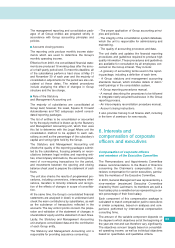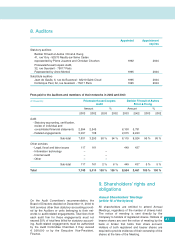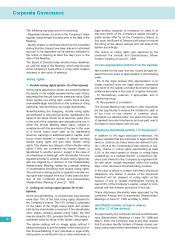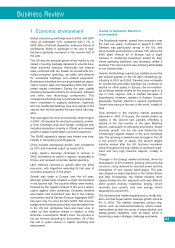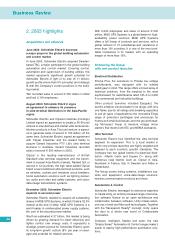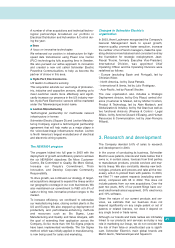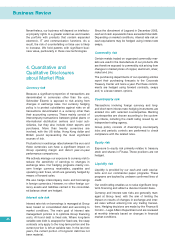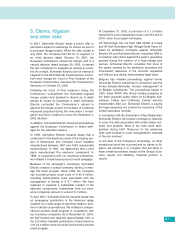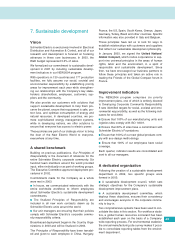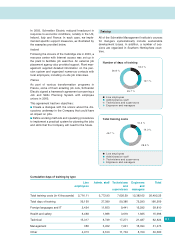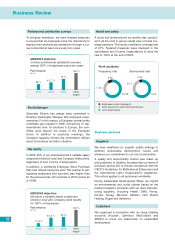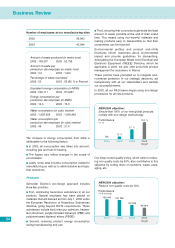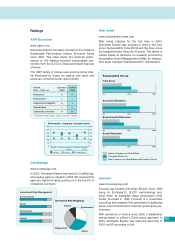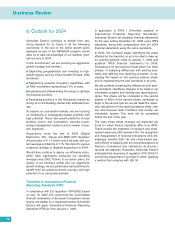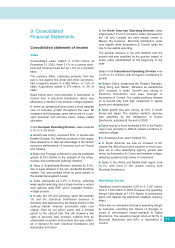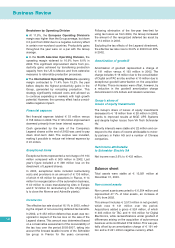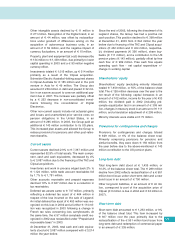APC 2003 Annual Report Download - page 51
Download and view the complete annual report
Please find page 51 of the 2003 APC annual report below. You can navigate through the pages in the report by either clicking on the pages listed below, or by using the keyword search tool below to find specific information within the annual report.
7. Sustainable development
Vision
Schneider Electric is exclusively involved in Electrical
Distribution and Automation & Control, and all of our
research and development is focused on fostering
advances in these core businesses. In 2003, the
R&D budget represented 5.6% of sales.
We formalized our commitment to sustainable devel-
opment in 2001 by including sustainable develop-
ment indicators in our NEW2004 program.
With operations in 130 countries and 177 production
facilities, we fully assume our social, societal and
environmental responsibility by establishing priority
areas for improvement each year while strengthen-
ing our relationships with the Company’s key stake-
holders: shareholders, employees, customers, sup-
pliers and the community.
We also provide our customers with solutions that
support sustainable development to help them pre-
serve the planet, ensure their equipment is safe, pro-
tect lives, and optimize consumption of energy and
natural resources. In developed countries, we pro-
mote sophisticated energy management systems,
while in developing nations, we offer solutions to
ensure that everyone has access to electric power.
These policies are part of our strategic vision to bring
the best of the New Electric World to everyone,
everywhere at any time.
A shared benchmark
Building on previous publications,
Our Principles of
Responsibility
is the document of reference for the
entire Schneider Electric corporate community. Six
hundred team members around the world provided
input, either individually or as part of working groups.
The Executive Committee approved deployment pro-
cedures in 2002.
Commitments made for the Company as a whole
were met in 2003:
■In house, we communicated extensively with the
entire worldwide workforce to inform employees
about Schneider Electric’s sustainable development
commitments.
■The finalized Principles of Responsibility are
included in all new work contracts drawn up by
Schneider Electric units around the world.
■Our unit managers are ensuring that their policies
comply with Schneider Electric’s corporate commu-
nity responsibility criteria.
Broad-based deployment began in the Country Orga-
nizations in 2003 and will be finalized in 2004.
The
Principles of Responsibility
have been translat-
ed and given to each employee in China, Hungary,
France, the US, Spain, South Korea, Greece, Japan,
Germany, Turkey, Brazil and other countries. Specific
information was also provided in Italy and Belgium.
These principles have led us to look for ways to
establish relationships with customers and suppliers
that reflect our sustainable development philosophy.
In January 2003, we signed the United Nations’
Global Compact, which invites corporations to sup-
port nine universal principles in the areas of human
rights, labor and the environment, in a spirit of
responsible and sustainable development. Since
then, we have encouraged our business partners to
follow these principles and taken an active role in
leading the Friends of the Global Compact forum in
France.
Improvement indicators
The NEW2004 program comprises six priority
improvement plans, one of which is entirely devoted
to Developing Corporate Community Responsibility.
It sets identified targets for social, societal and envi-
ronmental responsibility, as well as the following indi-
cators for end-2004:
■Ensure that 100% of our manufacturing units and
logistics sites comply with ISO 14001.
■Ensure that 80% of sites have a commitment with
Schneider Electric’s Foundations.
■Ensure that 100% of our new global products com-
ply with eco-design methodology.
■Ensure that 100% of our employees have social
coverage.
Each quarter, indicator results are consolidated and
sent to all our managers.
A dedicated organization
Following the creation of a sustainable development
department in 2002, two specific groups were
formed in 2003:
■A sustainable development council, which sets
strategic objectives for the Company’s sustainable
development improvement plans.
■A sustainable development committee, which
deploys these objectives, ensures their consistency
and encourages everyone in the corporate commu-
nity to buy in.
Two comprehensive systems have been used to con-
solidate the data in this section. For workforce statis-
tics, a global human resources scorecard has been
established each year on the basis of a Company-
wide reporting process. For environmental statistics,
the annual manufacturing site survey makes it possi-
ble to consolidate reporting tables from the environ-
ment department.
49


